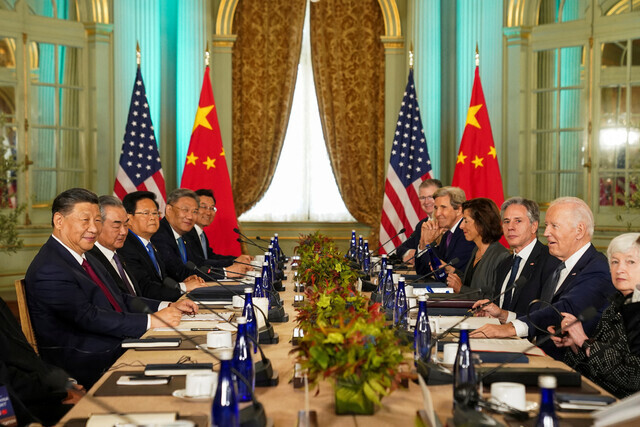hankyoreh
Links to other country sites 다른 나라 사이트 링크
[Editorial] S. Korea should take a note from US-China tactical compromise

In their first meeting in a year, the leaders of the US and China agreed to reopen lines of communication between their two militaries. The two powerful countries reached a “tactical compromise,” agreeing to dial back their recent aggression and work to manage relations, at least for now. But the two leaders also confirmed that they have no intention of compromising on key issues, including Taiwan and cutting-edge technology.
US President Joe Biden and Chinese President Xi Jinping agreed to resume contacts between their two militaries and to discuss regulations on artificial intelligence during a four-hour meeting at the Filoli estate, near San Francisco, on Wednesday.
Restoring the lines of military communication that were severed after then-US Speaker of the House Nancy Pelosi visited Taiwan in August 2022 repairs a mechanism for preventing unintended clashes in the South China Sea and the Taiwan Strait.
While Biden and Xi have often butted heads in the past, they made conciliatory gestures during this summit, in a nod to the domestic situations in their respective countries. Biden needs to keep the economy humming, with the next presidential election just one year away. Meanwhile, Xi needs to improve relations with the US to boost the Chinese economy, which is currently struggling with unemployment and sluggish growth even after China repealed its “zero-COVID” policy.
But what has become even clearer is that neither country is willing to give an inch on key issues such as Taiwan and cutting-edge technology. On the issue of Taiwan, Xi said that reunification is inevitable, while also complaining about the US’ “technological pressure” on China and asking the US to ease its restrictions on high-tech exports to China. Biden reaffirmed that the US won’t provide China with technology that can be used against it.
Although both leaders stressed that they don’t want clashes or altercations, long-term competition and conflict will continue.
As the arms race accelerates and the world order is weakened by Russia’s invasion of Ukraine, which will soon enter its third year, and by unrest in the Middle East driven by Israel’s onslaught on the Gaza Strip, it is the duty of the US and China to cooperate on maintaining peace and order in the world.
While South Korean President Yoon Suk-yeol has been focusing his diplomatic efforts on bilateral cooperation with the US and trilateral cooperation with the US and Japan, he needs to take advantage of the diplomatic leeway afforded by the US and China’s “tactical compromise” to step up efforts to tackle the national security and economic challenges facing Korea. It’s time for Yoon to revise his foreign policy strategy, which has basically disregarded relations with China.
And considering that the North Korean nuclear issue hardly even came up in the US-China summit, Koreans ought to give more thought to what kind of roadmap is needed to resolve that issue, which is South Korea’s greatest national security challenge.
Please direct questions or comments to [english@hani.co.kr]

Editorial・opinion
![[Column] Season 2 of special prosecutor probe may be coming to Korea soon [Column] Season 2 of special prosecutor probe may be coming to Korea soon](https://flexible.img.hani.co.kr/flexible/normal/500/300/imgdb/original/2024/0426/3317141030699447.jpg) [Column] Season 2 of special prosecutor probe may be coming to Korea soon
[Column] Season 2 of special prosecutor probe may be coming to Korea soon![[Column] Park Geun-hye déjà vu in Yoon Suk-yeol [Column] Park Geun-hye déjà vu in Yoon Suk-yeol](https://flexible.img.hani.co.kr/flexible/normal/500/300/imgdb/original/2024/0424/651713945113788.jpg) [Column] Park Geun-hye déjà vu in Yoon Suk-yeol
[Column] Park Geun-hye déjà vu in Yoon Suk-yeol- [Editorial] New weight of N. Korea’s nuclear threats makes dialogue all the more urgent
- [Guest essay] The real reason Korea’s new right wants to dub Rhee a founding father
- [Column] ‘Choson’: Is it time we start referring to N. Korea in its own terms?
- [Editorial] Japan’s rewriting of history with Korea has gone too far
- [Column] The president’s questionable capacity for dialogue
- [Column] Are chaebol firms just pizza pies for families to divvy up as they please?
- [Column] Has Korea, too, crossed the Rubicon on China?
- [Correspondent’s column] In Japan’s alliance with US, echoes of its past alliances with UK
Most viewed articles
- 1‘We must say no’: Seoul defense chief on Korean, USFK involvement in hypothetical Taiwan crisis
- 2Why Kim Jong-un is scrapping the term ‘Day of the Sun’ and toning down fanfare for predecessors
- 3Two factors that’ll decide if Korea’s economy keeps on its upward trend
- 4BTS says it wants to continue to “speak out against anti-Asian hate”
- 5After election rout, Yoon’s left with 3 choices for dealing with the opposition
- 6Gangnam murderer says he killed “because women have always ignored me”
- 7South Korea officially an aged society just 17 years after becoming aging society
- 8Noting shared ‘values,’ Korea hints at passport-free travel with Japan
- 9Ethnic Koreans in Japan's Utoro village wait for Seoul's help
- 10US citizens send letter demanding punishment of LKP members who deny Gwangju Massacre